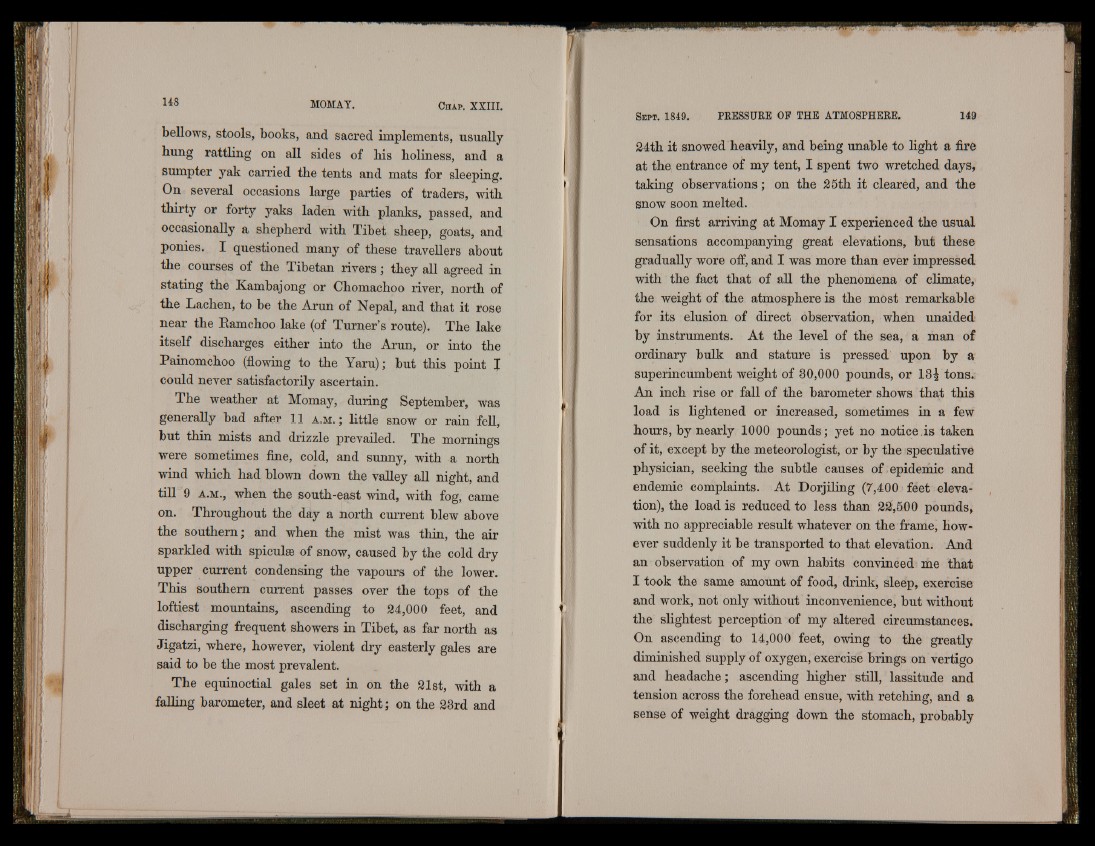
bellows, stools, books, and sacred implements, usually
bung rattling on all sides of bis holiness, and a
sumpter yak carried tbe tents and mats for sleeping.
On several occasions large parties of traders, with
thirty or forty yaks laden with planks, passed, and
occasionally a shepherd with Tibet sheep, goats, and
ponies. I questioned many of these travellers about
the courses of the Tibetan riv ers; they all agreed in
stating the Kambajong or Chomachoo river, north of
the Lachen, to be the Arun of Nepal, and that it rose
near the Ramchoo lake (of Turner’s route). The lake
itself discharges either into the Arun, or into the
Painomchoo (flowing to the Yaru); but this point J
could never satisfactorily ascertain.
The weather at Momay, during September, was
generally bad after 11 a .m .; little snow or rain fell,
but thin mists and drizzle prevailed. The mornings
were sometimes fine, cold, and sunny, with a north
wind which had blown down the valley all night, and
till 9 a .m ., when the south-east wind, with fog, came
on. Throughout the day a north current blew above
the southern; and when the mist was thin, the air
sparkled with spiculse of snow, caused by the cold dry
upper current condensing the vapours of the lower.
This southern current passes over the tops of the
loftiest mountains, ascending to 24,000 feet, and
discharging frequent showers in Tibet, as far north as
Jigatzi, where, however, violent dry easterly gales are
said to be the most prevalent.
The equinoctial gales set in on the 21st, with a
falling barometer, and sleet at night; on the 23rd and
24th it snowed heavily, and being unable to light a fire
at the entrance of my tent, I spent two wretched days,
taking observations; on the 25th it cleared, and the
snow soon melted.
On first arriving at Momay I experienced the usual
sensations accompanying great elevations, but these
gradually wore off, and I was more than ever impressed
with the fact that of all the phenomena of climate,
the weight of the atmosphere is the most remarkable
for its elusion of direct observation, when unaided
by instruments. At the level of the sea, a man of
ordinary bulk and stature is pressed upon by a
superincumbent weight of 30,000 pounds, or 1 3 | tons.
An inch rise or fall of the barometer shows that this
load is lightened or increased, sometimes in a few
hours, by nearly 1000 pounds; yet no notice.is taken
of it, except by the meteorologist, or by the speculative
physician, seeking the subtle causes of epidemic and
endemic complaints. At Dorjiling (7,400 feet elevation),
the load is reduced to less than 22,500 pounds,
with no appreciable result whatever on the frame, however
suddenly it be transported to that elevation. And
an observation of my own habits convinced me that
I took the same amount of food, drink, sleep, exercise
and work, not only without inconvenience, but without
the slightest perception of my altered circumstances.
On ascending to 14,000 feet, owing to the greatly
diminished supply of oxygen, exercise brings on vertigo
and headache; ascending higher still, lassitude and
tension across the forehead ensue, with retching, and a
sense of weight dragging down the stomach, probably